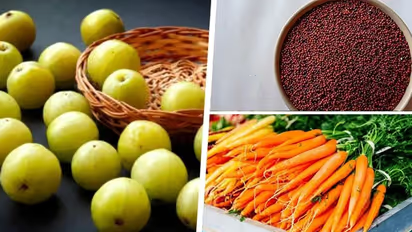Jaggery to Bajra, 6 winter superfoods to add to your diet
Published : Dec 09, 2022, 07:30 AM IST
Chilly winter weather affects more than just your wardrobe and heating bill. Your body also experiences energy levels, metabolism, and food preferences changes. Here are some food you should include in your diet during winter.
Explore the latest Lifestyle News covering fashion, wellness, travel, Food and Recipes, and more. Stay updated with trending Health News, fitness tips, and expert insights to inspire your daily living. Discover personalized lifestyle trends that keep you stylish and informed. Download the Asianet News Official App from the Android Play Store and iPhone App Store for everything that adds value to your everyday life.
